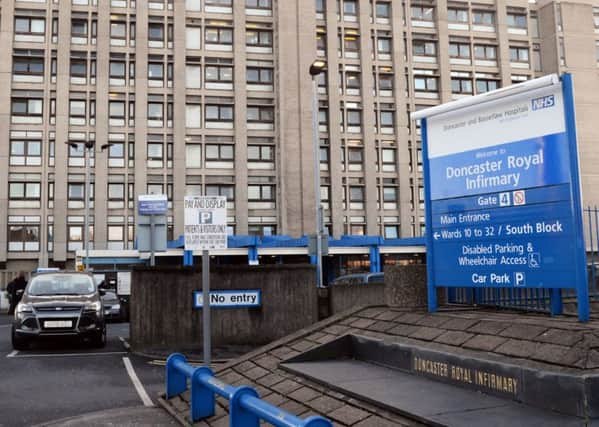Yorkshire hospitals boss blames '˜bad behaviour' from nearby trusts for staffing woes


Doncaster and Bassetlaw Hospitals NHS Foundation Trust (DBH) has revealed that staff that “could and perhaps should be working locally” are choosing to work for higher “cap breaking rates” elsewhere in the region.
As a result of staffing shortages the trust has had to suspend admissions to inpatient units and transfer patients to alternative sites in recent weeks.
Advertisement
Hide AdAdvertisement
Hide AdThe trust, which has raised the issue with health care watchdog NHS Improvement, has meanwhile recorded a total financial deficit of £46.8million for 2015/16.
The shortfall is largely the result of a financial misreporting scandal as well as a drop in the value of trust buildings.
In a report to the trust’s board, Mike Pinkerton, DBH chief executive, said: “All trusts are obliged to work within the rules as now set and our adherence to those rules is in a sense therefore independent to our overall financial position and the whole basis is that all trusts stick to the rules and the policy will fail if we do not, so bad behaviour elsewhere should not, at least in the short term, encourage us to not comply with the requirements set for us.”
He said that the difficulty is that trusts can break the agency cap if they justify it on patient safety grounds, arguing that such circumstances are “subjective and context dependent”.
Advertisement
Hide AdAdvertisement
Hide AdMr Pinkerton, who admitted that DBH has breached the cap but only where “safety concerns warranted it”, added: “There is a key issue that staff that could and perhaps should be working locally are choosing to work for higher and cap breaking rates of pay elsewhere.
“As staff enter locum work often for the purpose of having higher wages with limited ongoing responsibilities, this is hardly surprising behaviour from locum staff, who will follow the market.”
In November, Health Secretary Jeremy Hunt targeted the £3.3billion annual NHS spend on agency staff, who were claiming higher rates from stretched trusts, by introducing limits on such pay.
The move was meant to reduce the national agency bill by £1bn a year after spiralling costs saw hospital trusts in Yorkshire spend £113million on agency doctors and nurses in 2014/15 – a rise of a third in a year.
Advertisement
Hide AdAdvertisement
Hide AdAs of April agency staff can only receive 55 per cent more than NHS employees – the extra allowing for their lack of paid holiday, sick pay and pensions.
Last year DBH commissioned an independent investigation after a shock multi-million pound blackhole in its finances was uncovered.
A report into the matter by finance firm KPMG found that a “small number of individuals from the senior finance team” at the trust “played some part in the misreporting”, prompting disciplinary action.
Trust bosses say they are continuing to work with NHS Improvement to improve its financial position so DBH “can carry on providing quality care to patients in the long term”.